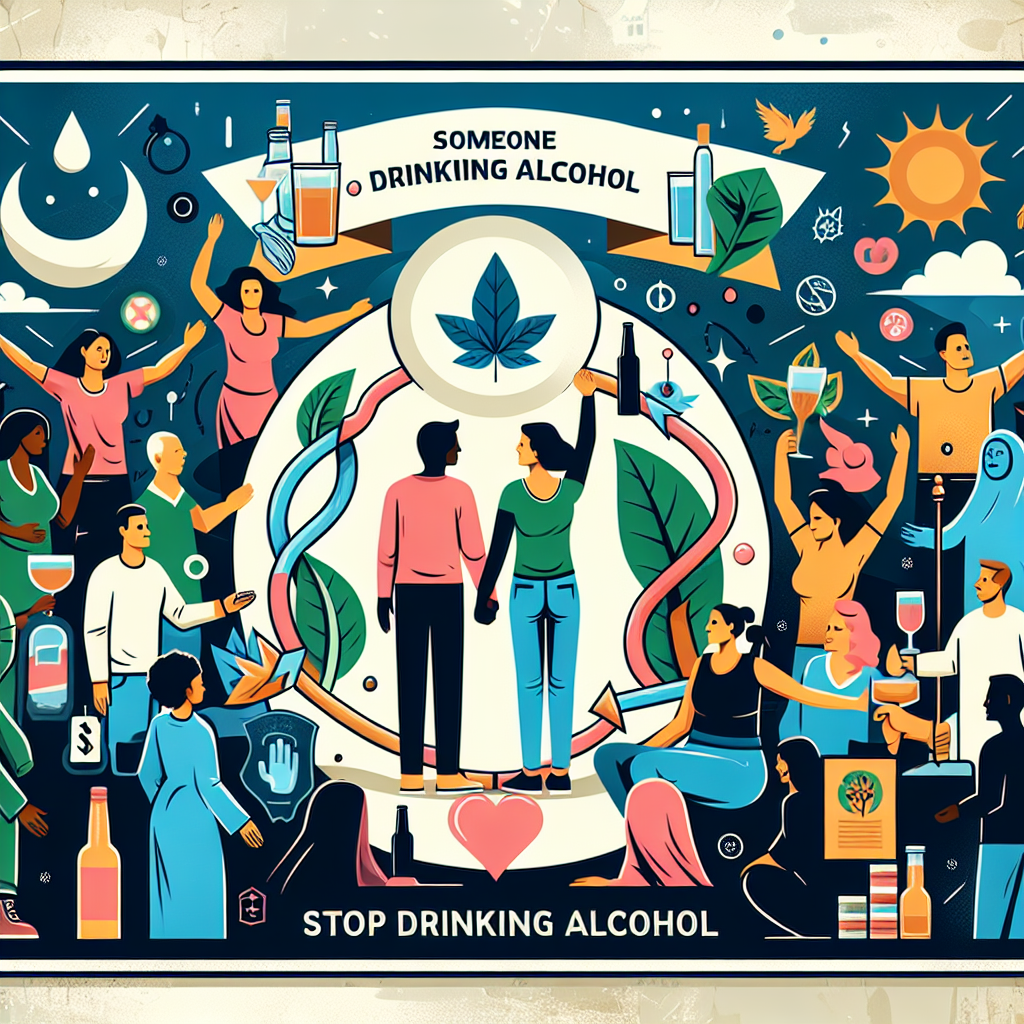-
Table of Contents

“Empower Your Life: Break Free from Alcohol and Embrace Sobriety”
Introduction
Stopping drinking and maintaining sobriety is a challenging but achievable goal that requires a multifaceted approach. It begins with acknowledging the problem and making a firm commitment to change. Seeking professional help, such as therapy or joining support groups like Alcoholics Anonymous, can provide essential guidance and encouragement. Developing a strong support network of friends and family, adopting healthy coping mechanisms, and making lifestyle changes to avoid triggers are crucial steps. Additionally, setting realistic goals, celebrating small victories, and being patient with oneself can significantly aid in the journey to sobriety.
Practical Strategies to Stop Drinking and Maintain Sobriety
Embarking on the journey to stop drinking and maintain sobriety is a commendable decision that requires both courage and commitment. The path to sobriety is often fraught with challenges, but with practical strategies and a steadfast mindset, it is entirely achievable. One of the first steps in this journey is acknowledging the problem and making a firm decision to change. This self-awareness is crucial as it lays the foundation for all subsequent actions.
Once the decision is made, setting clear and realistic goals becomes essential. These goals should be specific, measurable, and attainable, allowing for a sense of accomplishment as each milestone is reached. For instance, starting with a goal to reduce alcohol intake gradually can be more manageable than attempting to quit cold turkey. This approach not only eases the transition but also helps in building confidence and resilience.
In addition to setting goals, seeking support is a vital component of the recovery process. Surrounding oneself with a supportive network of friends, family, or support groups can provide the encouragement and accountability needed to stay on track. Support groups, such as Alcoholics Anonymous (AA), offer a sense of community and shared experiences, which can be incredibly motivating. Moreover, professional help from therapists or counselors specializing in addiction can provide personalized strategies and coping mechanisms.
Another practical strategy is to identify and avoid triggers that may lead to drinking. Triggers can be people, places, or situations that evoke the urge to drink. By recognizing these triggers, one can develop a plan to avoid or cope with them effectively. For example, if social gatherings are a trigger, it might be helpful to attend events with a sober friend or to have an exit plan in place. Additionally, finding healthy alternatives to cope with stress or boredom, such as exercise, hobbies, or mindfulness practices, can significantly reduce the temptation to drink.
Creating a structured routine can also play a pivotal role in maintaining sobriety. A well-organized daily schedule helps in keeping the mind occupied and reduces the likelihood of succumbing to cravings. Incorporating activities that promote physical and mental well-being, such as regular exercise, balanced nutrition, and adequate sleep, can enhance overall health and support the recovery process.
Furthermore, celebrating small victories along the way can boost morale and reinforce the commitment to sobriety. Each day without alcohol is a triumph, and acknowledging these achievements can provide the motivation to continue. Keeping a journal to document progress and reflect on the journey can also be a powerful tool for self-encouragement and growth.
Lastly, it is important to remain patient and compassionate with oneself. Recovery is a gradual process, and setbacks may occur. Instead of viewing these setbacks as failures, they should be seen as opportunities to learn and grow stronger. Embracing a positive mindset and focusing on the progress made rather than the occasional slip-ups can make a significant difference in the long run.
In conclusion, stopping drinking and staying sober is a challenging yet rewarding endeavor. By setting clear goals, seeking support, identifying triggers, creating a structured routine, celebrating small victories, and maintaining a positive mindset, one can navigate the path to sobriety with confidence and determination. Remember, every step taken towards a sober life is a step towards a healthier, happier future.
Building a Support System for Long-Term Sobriety
Building a support system for long-term sobriety is a crucial step in the journey to stop drinking and stay sober. The path to sobriety is often fraught with challenges, and having a network of supportive individuals can make a significant difference. One of the first steps in building this support system is to identify the people in your life who genuinely care about your well-being. These individuals can be family members, friends, or even colleagues who understand your struggle and are willing to offer their support.
In addition to personal connections, joining a support group can be incredibly beneficial. Groups such as Alcoholics Anonymous (AA) provide a safe space where individuals can share their experiences and receive encouragement from others who are on a similar journey. The sense of community and shared understanding found in these groups can be a powerful motivator to stay sober. Moreover, the structure of regular meetings and the availability of a sponsor can provide the accountability needed to maintain sobriety.
Professional help is another essential component of a robust support system. Therapists and counselors who specialize in addiction can offer valuable insights and coping strategies tailored to your specific needs. They can help you understand the underlying causes of your drinking and work with you to develop healthier ways to deal with stress and emotional triggers. Additionally, medical professionals can provide guidance on any necessary medications that can aid in the recovery process.
While external support is vital, it is equally important to cultivate self-supportive habits. Developing a routine that includes regular exercise, a balanced diet, and sufficient sleep can significantly impact your overall well-being and ability to stay sober. Exercise, in particular, has been shown to reduce stress and improve mood, which can be beneficial in managing cravings and preventing relapse. Engaging in hobbies and activities that you enjoy can also provide a positive outlet for your energy and help you build a fulfilling life without alcohol.
Setting realistic goals and celebrating small victories along the way can also reinforce your commitment to sobriety. It is important to acknowledge your progress and give yourself credit for the hard work you are putting in. This positive reinforcement can boost your confidence and motivate you to continue on your path.
Furthermore, educating yourself about addiction and recovery can empower you to make informed decisions about your health. Understanding the science behind addiction and the various stages of recovery can demystify the process and make it feel more manageable. There are numerous books, articles, and online resources available that can provide valuable information and insights.
Lastly, it is essential to be patient with yourself and recognize that recovery is a journey, not a destination. There will be ups and downs, and it is important to approach each day with a mindset of perseverance and self-compassion. Surrounding yourself with a supportive network, seeking professional help, and developing self-care habits are all integral parts of building a strong foundation for long-term sobriety. By taking these steps, you can create a support system that not only helps you stop drinking but also empowers you to lead a healthy, fulfilling life free from alcohol.
Q&A
1. **Question:** What are some effective strategies to stop drinking alcohol?
**Answer:** Effective strategies to stop drinking alcohol include seeking professional help through therapy or counseling, joining support groups like Alcoholics Anonymous (AA), setting clear and achievable goals, avoiding triggers and high-risk situations, and developing healthy coping mechanisms such as exercise, hobbies, and mindfulness practices.
2. **Question:** How can someone maintain long-term sobriety after quitting alcohol?
**Answer:** To maintain long-term sobriety, individuals can continue attending support group meetings, build a strong support network of friends and family, engage in regular physical activity, practice stress management techniques, avoid environments where alcohol is present, and seek ongoing therapy or counseling to address underlying issues and prevent relapse.
Conclusion
To stop drinking and stay sober, it is essential to acknowledge the problem and seek professional help, such as therapy or support groups like Alcoholics Anonymous. Developing a strong support network of friends and family, avoiding triggers, and finding healthy coping mechanisms are crucial. Establishing new routines, setting clear goals, and celebrating milestones can reinforce sobriety. Continuous self-reflection and possibly engaging in activities that promote mental and physical well-being, such as exercise and hobbies, can also support long-term sobriety.



